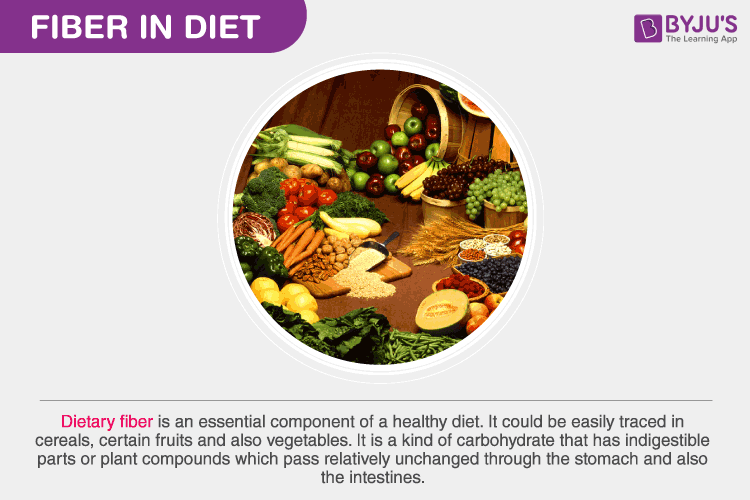Are you curious about the role of fiber in a healthy diet? Look no further! In this article, we will explore the importance of fiber and its impact on your overall well-being. From promoting healthy digestion to managing weight, fiber plays a crucial role in maintaining a balanced diet. So, grab a cup of tea and join us as we unravel the wonders of fiber.
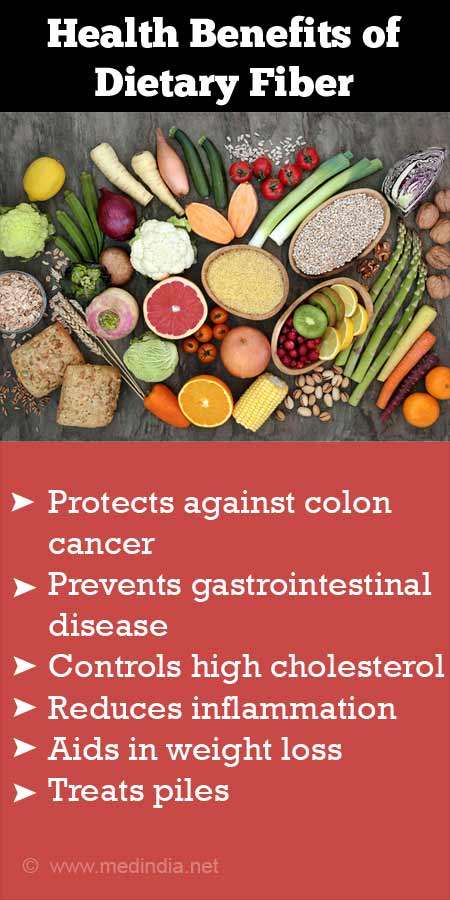
Benefits of Fiber
Fiber plays a crucial role in maintaining good health, particularly when it comes to the digestive system. By including an adequate amount of fiber in your diet, you can experience a range of benefits that promote a healthy and efficient digestive system. From promoting healthy digestion to reducing the risk of chronic diseases, fiber is truly a dietary powerhouse.
Promotes Healthy Digestion
One of the primary benefits of fiber is its ability to promote healthy digestion. When you consume foods rich in fiber, it adds bulk to your stool, making it easier to pass through the digestive tract. This can help to prevent constipation and promote regular bowel movements. By keeping your digestive system functioning smoothly, fiber ensures that waste is efficiently eliminated from your body.
Prevents Constipation
Nobody likes dealing with constipation, but fortunately, fiber can help prevent this uncomfortable condition. Fiber adds bulk to your stool, increasing its volume and softening it, which makes it easier to pass through the intestines. By facilitating regular bowel movements, fiber prevents constipation and promotes overall digestive health.
Maintains Bowel Health
In addition to preventing constipation, fiber also plays a crucial role in maintaining the health of your bowel. Fiber helps to prevent the development of hemorrhoids, which are swollen blood vessels in the rectum or anus that can cause pain and discomfort. Additionally, a diet rich in fiber can reduce the risk of developing small pouches in the colon, known as diverticula, which can lead to diverticulosis or diverticulitis. By keeping your bowel healthy, fiber contributes to overall digestive well-being.
Reduces the Risk of Chronic Diseases
Including fiber in your diet can also help to reduce the risk of chronic diseases. Studies have shown that a high-fiber diet is associated with a lower risk of developing conditions such as heart disease, stroke, type 2 diabetes, and certain types of cancer. The exact mechanisms behind these protective effects are not fully understood, but it is believed that fiber helps to regulate blood cholesterol levels, stabilize blood sugar levels, and promote a healthy gut environment, all of which contribute to a reduced risk of chronic diseases.
Types of Fiber
Not all fiber is created equal. There are two main types of dietary fiber, each with its own unique properties and benefits.
Soluble Fiber
Soluble fiber dissolves in water and forms a gel-like substance in the digestive system. This type of fiber is known for its ability to absorb water, which adds bulk to the stool, promotes regular bowel movements, and helps to prevent constipation. Soluble fiber also plays a crucial role in regulating blood sugar levels by slowing down the absorption of sugar into the bloodstream. Foods rich in soluble fiber include oats, legumes, apples, oranges, and carrots.
Insoluble Fiber
Unlike soluble fiber, insoluble fiber does not dissolve in water. Instead, it adds bulk to the stool, which helps to prevent constipation and promote regular bowel movements. Insoluble fiber acts as a natural laxative, speeding up the transit time of food through the digestive system. This type of fiber is found in foods such as whole grains, nuts, seeds, and most vegetables.
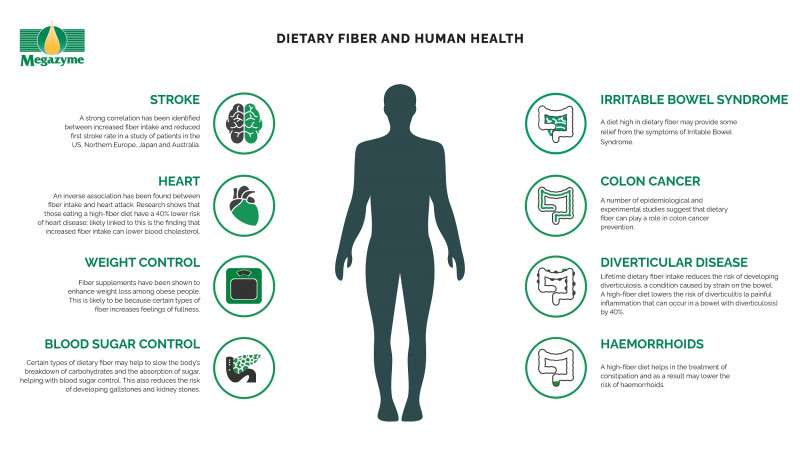
Recommended Daily Fiber Intake
The amount of fiber you need to consume daily varies depending on your age, gender, and certain life stages. Here are the recommended daily fiber intake guidelines for different population groups:
Adults
For adults aged 18-50 years, the recommended daily fiber intake is around 25-35 grams for women and 30-38 grams for men. As we age, our digestive system becomes less efficient, so it’s important to maintain an adequate fiber intake to support digestive health.
Children
For children, the daily fiber intake varies depending on their age. For children aged 1-3 years, the recommended daily fiber intake is around 19 grams. For children aged 4-8 years, the recommended intake increases to 25 grams. As they enter adolescence, the recommended intake gradually rises to match that of adults.
Pregnant Women
During pregnancy, it’s important for women to consume an additional 5 grams of fiber per day to support their changing nutritional needs. The recommended daily fiber intake for pregnant women is around 28-30 grams.
Elderly
For individuals over the age of 50, the daily fiber intake recommendation is slightly lower. It is advised that men consume around 30 grams of fiber per day, while women should aim for around 21 grams. This adjustment takes into account the reduced caloric needs and potential digestive issues that may arise as we age.
Fiber-Rich Foods
Including fiber-rich foods in your diet is essential to meet your daily fiber intake goals. Here are some excellent sources of dietary fiber:
Whole Grains
Whole grains are a fantastic source of fiber, offering both soluble and insoluble fiber. Opt for whole wheat bread, brown rice, quinoa, oats, and whole grain cereals to increase your fiber intake. These foods provide essential nutrients along with their fiber content, making them a great addition to a balanced diet.
Legumes
Legumes, including beans, lentils, chickpeas, and peas, are incredibly rich in fiber. They provide a good amount of both soluble and insoluble fiber, making them a versatile and nutritious addition to various meals. Legumes also offer a host of other health benefits, such as being a good source of plant-based protein and containing important minerals like iron and zinc.
Fruits
Fruits are not only delicious but also packed with fiber. Berries, apples, pears, and citrus fruits are particularly high in fiber. Eating fruits whole, with their skin intact, will maximize your fiber intake. Additionally, fruits offer a range of vitamins, minerals, and antioxidants, making them a healthy choice for overall well-being.
Vegetables
Vegetables are another excellent source of fiber. Dark leafy greens, cruciferous vegetables like broccoli and Brussels sprouts, and root vegetables such as carrots and sweet potatoes all provide a good amount of dietary fiber. Including a variety of vegetables in your meals ensures a diverse fiber intake, along with a plethora of other essential nutrients.
Nuts and Seeds
Nuts and seeds make for a great fiber-rich snack option. Almonds, chia seeds, flaxseeds, and sunflower seeds are all high in both soluble and insoluble fiber. They also offer healthy fats and other beneficial compounds, making them a well-rounded addition to your diet.
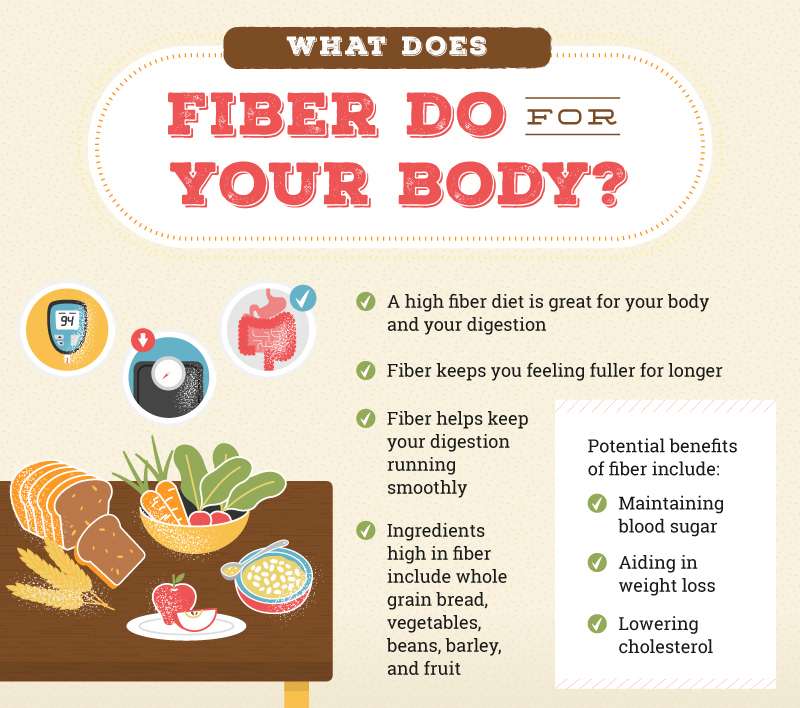
Understanding Fiber and Gut Health
The relationship between fiber and gut health is a topic of considerable research and interest in the field of nutrition. The gut, also known as the gastrointestinal tract, plays a vital role in our overall well-being, and fiber has been found to have significant effects on its function.
Effects on Gut Microbiota
The gut is home to trillions of microorganisms collectively known as the gut microbiota. These microbes play a crucial role in various aspects of health, including digestion, immune function, and metabolism. Dietary fiber acts as a prebiotic, providing nourishment for the beneficial bacteria in the gut. When these bacteria ferment fiber, they produce short-chain fatty acids, which are essential for maintaining a healthy gut environment.
Role in Preventing Gut Infections
Fiber also plays a role in preventing gut infections. By promoting the growth of beneficial bacteria, fiber helps to maintain a balance that can protect against harmful bacteria or pathogens. Certain types of fiber, such as resistant starch, have been found to enhance the production of antimicrobial substances in the gut, further contributing to a healthier gut environment.
Improvement of Gut Barrier Function
The gut barrier is a protective layer that prevents harmful substances from passing through the intestinal wall and entering the bloodstream. Adequate fiber intake has been associated with improved gut barrier function, which helps to prevent the penetration of toxins and pathogens into the bloodstream. By maintaining a healthy gut barrier, fiber contributes to overall gut health and reduces the risk of various digestive disorders.
Fiber and Weight Management
If you’re looking to manage your weight effectively, fiber can be a helpful tool. Including fiber-rich foods in your diet can contribute to weight management in several ways.
Enhanced Satiety
Fiber-rich foods tend to be more filling and satisfying than low-fiber foods. When you consume a meal that is high in fiber, it takes longer to chew and digest, giving your body more time to register feelings of fullness. This increased satiety can help prevent overeating and support weight management goals.
Reduced Calorie Intake
Foods rich in dietary fiber often have a lower calorie density compared to foods that are low in fiber. For example, a serving of fruits or vegetables provides a significant amount of fiber while being relatively low in calories. By choosing fiber-rich foods, you can enjoy larger portions without consuming excessive calories, making it easier to maintain a healthy weight.
Lowered Body Weight
Research has shown that individuals who consume a diet high in fiber tend to have lower body weights and lower body mass indexes (BMI). This could be attributed to the satiating effect of fiber, as well as its ability to regulate blood sugar levels and improve insulin sensitivity. By including fiber in your diet, you can support your weight management efforts and promote a healthier body composition.
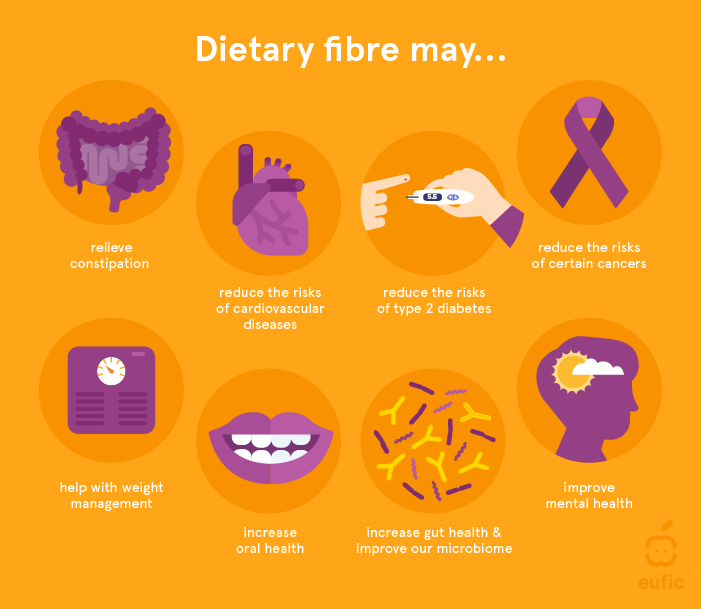
Impact of Fiber on Blood Sugar Levels
Fiber has a significant impact on blood sugar levels, making it beneficial for both individuals with diabetes and those looking to prevent blood sugar spikes.
Slowing Down Digestion
When you consume foods high in fiber, they take longer to be digested and absorbed by the body compared to low-fiber foods. This slower digestion process allows for a more gradual release of sugar into the bloodstream, preventing sudden spikes in blood sugar levels. By regulating the rate at which carbohydrates are broken down and absorbed, fiber helps to maintain stable blood sugar levels.
Prevention of Blood Sugar Spikes
High-fiber foods have a lower glycemic index (GI) compared to low-fiber foods. The glycemic index is a measure of how quickly a carbohydrate-containing food raises blood sugar levels. Consuming foods with a lower GI, such as whole grains, legumes, and non-starchy vegetables, can help prevent blood sugar spikes. This is particularly beneficial for individuals with diabetes, as it supports better blood sugar control.
Management of Diabetes
Fiber can play a significant role in managing diabetes by improving blood sugar control and reducing the risk of complications. Studies have shown that a high-fiber diet can improve glycemic control, increase insulin sensitivity, and reduce the need for medication in individuals with type 2 diabetes. Including fiber-rich foods as part of a balanced diabetes management plan can help individuals better manage their blood sugar levels and overall health.
Fiber and Heart Health
Maintaining a healthy heart is essential for overall well-being, and fiber can play a significant role in promoting heart health.
Cholesterol Management
Fiber, especially soluble fiber, has been shown to have a positive impact on cholesterol levels. Soluble fiber helps to reduce low-density lipoprotein (LDL) cholesterol, also known as “bad” cholesterol, by binding to it and assisting in its elimination from the body. By lowering LDL cholesterol levels, fiber helps to maintain a healthy lipid profile and reduce the risk of heart disease.
Lowered Blood Pressure
High blood pressure, or hypertension, is a significant risk factor for heart disease. Several studies have found that a diet rich in fiber, particularly from whole grains and fruits, is associated with lower blood pressure levels. The mechanisms behind this relationship are not yet fully understood, but it is believed that the beneficial effects of fiber on blood pressure may be due to its ability to improve blood vessel function and reduce inflammation.
Reduced Risk of Heart Disease
The combined effects of fiber on cholesterol management and blood pressure reduction contribute to a reduced risk of heart disease. A high-fiber diet has been consistently associated with a lower risk of developing heart disease, including conditions such as coronary artery disease and stroke. By including fiber-rich foods in your diet, you can support heart health and reduce the risk of cardiovascular complications.
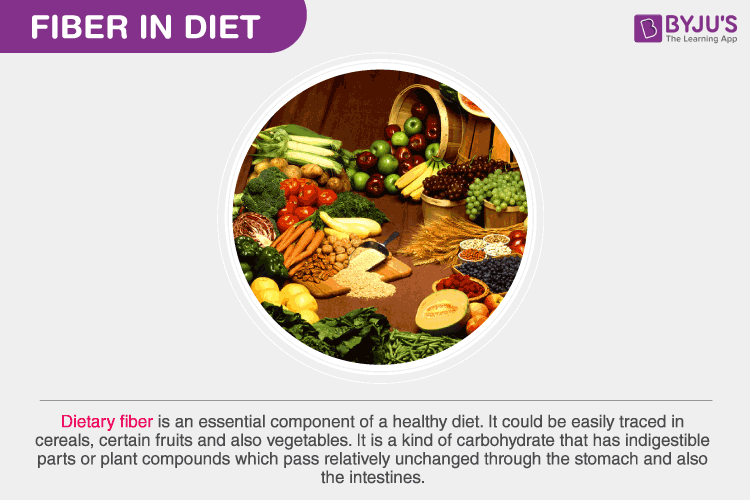
Fiber and Cancer Prevention
Studies have suggested that a diet high in fiber may play a role in reducing the risk of certain types of cancer.
Colon Cancer
There is substantial evidence to suggest that dietary fiber, particularly from whole grains and plant-based foods, can help reduce the risk of colon cancer. Fiber helps to maintain regular bowel movements and prevent the buildup of toxins in the colon, which may contribute to the development of cancerous cells. Additionally, the fermentation of fiber in the gut produces short-chain fatty acids, which have been shown to have anti-cancer effects.
Breast Cancer
While the relationship between fiber and breast cancer is less conclusive than with colon cancer, some studies have suggested that a high-fiber diet may offer protection against breast cancer. Fiber-rich foods, such as fruits, vegetables, whole grains, and legumes, are generally associated with a lower risk of breast cancer. However, more research is needed to fully understand the mechanisms behind this relationship.
Other Types of Cancer
In addition to colon and breast cancer, a high-fiber diet has shown potential in reducing the risk of other types of cancer. These include cancer of the stomach, esophagus, and pancreas. While more research is needed to establish a definitive link, incorporating fiber-rich foods into your diet is a simple and effective way to support overall cancer prevention efforts.
Potential Side Effects of High Fiber Intake
While fiber is undoubtedly beneficial for health, consuming excessive amounts of fiber can lead to certain side effects.
Digestive Discomfort
If you suddenly increase your fiber intake without allowing your body time to adjust, you may experience digestive discomfort. Symptoms such as bloating, gas, and stomach cramps are common when too much fiber is consumed too quickly. To minimize these side effects, it is recommended to gradually increase your fiber intake over time and drink plenty of water to support digestion.
Nutrient Absorption Interference
High-fiber foods, especially those rich in insoluble fiber, can interfere with the absorption of certain minerals and nutrients. This is because fiber can bind to these substances in the digestive system, preventing their absorption into the bloodstream. While this is of minimal concern for individuals with a balanced diet, excessive consumption of fiber supplements or heavily relying on fiber-rich foods may lead to inadequate nutrient absorption. To avoid this, it is advisable to obtain most of your fiber from whole foods and maintain a varied diet.
Dehydration
Fiber absorbs water as it passes through the digestive system, which can lead to increased water loss if adequate hydration is not maintained. It is crucial to drink plenty of fluids, especially water, when consuming a high-fiber diet to prevent dehydration. Staying well-hydrated will ensure that fiber can perform its function of adding bulk to the stool without causing any adverse effects.
In conclusion, fiber is a vital component of a healthy diet. From promoting healthy digestion and preventing constipation to reducing the risk of chronic diseases, fiber offers numerous benefits. By including a variety of fiber-rich foods in your meals, you can easily meet your daily fiber intake requirements and support your overall well-being. Remember to gradually increase your fiber intake, stay hydrated, and listen to your body to enjoy the immense benefits that fiber has to offer.
